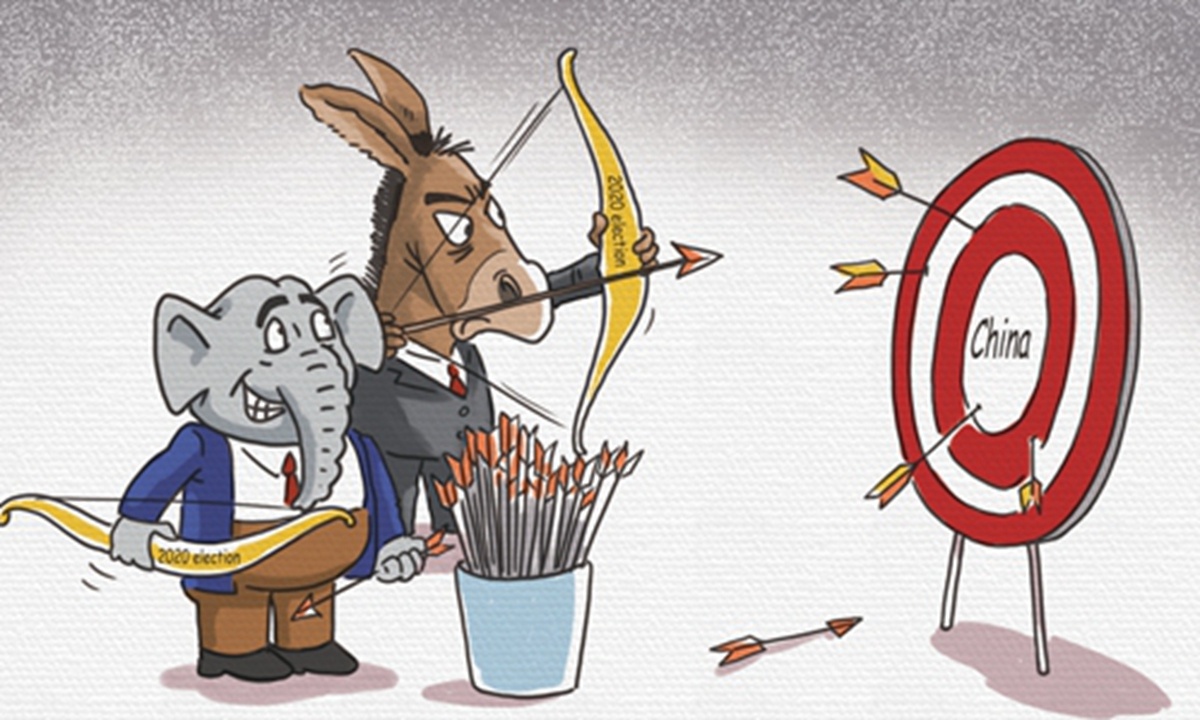
Illustration: Liu Rui/GT
Voice of America recently revealed a list of US president-elect Joe Biden's pontential advisors on China policies, including former deputy secretary of state Antony Blinken, former ambassador to the UN Samantha Power, former assistant secretary of state for East Asian and Pacific affairs Kurt Campbell, deputy director at the Center for a New American Security Ely Ratner, former national security advisors Jake Sullivan, Susan Rice and Thomas Donilon. According to their resumes, almost all of them come from the administration of former president Barack Obama.
As customary, these advisors are likely to become members of Biden's cabinet. Therefore, their points of view will significantly affect the Biden administration's future foreign policy.
Donilon in 2019 published an article in Foreign Affairs magazine, arguing that US incumbent President Donald Trump's trade war is "the wrong way to compete with China," and the US should focus on renewal, rather than protectionism. Blinken said in September that, "China's strategic position is stronger and ours is weaker as a result of President Trump's leadership." He also said that Trump left "a vacuum in the world for China to fill." Campbell and Sullivan wrote in Foreign Affairs in 2019 that, "the goal should be to establish favorable terms of coexistence with Beijing in four key competitive domains - military, economic, political and global governance."
Judging from the narratives from these advisors, the goal of Biden administration's China policy is almost identical to that of the Trump administration, albeit more tactfully stated. The Biden administration will continue to regard China as its main rival, seeing China as the biggest threat to maintain its position as a global hegemony. However, Biden will differ from Trump on dealing with this challenge.
Even though Donilon said that trade war is the wrong way to compete with Beijing, some Democrats are aware that Trump's manner to pressure China on trade has worked to some extent. The Biden administration may not withdraw all tariffs imposed on China as soon as he takes office, but will see them as bargaining chips to further negotiate with China. But as Donilon said, Biden would attach greater importance on "renewal," rather than trade deficits.
Many of Biden's advisors, such as Blinken and Sullivan, believe the US should improve its ties with Europe. It is expected that transatlantic frictions will be eased after Biden takes office. The US will hope European allies could play a big role in competing with China.
Blinken said Trump has weakened American alliances, abandoned US values and gave China a green light to trample on so-called human rights and democracy. This reflects the reality that the Biden administration will underline human rights and democracy, and will create an ideological alliance by uniting its allies such as Europe, Japan and South Korea in a bid to pile pressure on China.
Biden will be restrained in implementing these policies, however. Trump received nearly half of the popular votes. This embodies the fact that Trumpism enjoys a large following in the US. These forces will restrain Biden to return to liberalism and multilateralism.
Despite such rhetoric by these advisors, the Biden administration's foreign policy may not follow the path they described. This is because a country's foreign policy will be influenced by many factors. The House and the Senate are currently controlled by different parties. They are the ones who will make some policies difficult to implement. The Biden administration may make compromises with the Republicans on some foreign policy agendas, especially on China. The possibility that the new government will still remain tough on China cannot be ruled out.
The policies that the US will implement after the Democrats assume office and meet challenges and difficulties will be different from what they now expect. It also remains to be seen whether the foreign policies Biden will adopt will be consistent with what his advisors suggest.
Biden served as the vice president under the Obama administration for eight years. His diplomatic philosophy may inherit some of Obama's ideas. Most members of his team had positions under Obama's tenure. On issues including global governance, climate change and the Iran nuclear deal, Biden is very likely to continue Obama's philosophy. But when it comes to relations with China, he may incorporate some of Trump's ideas.
The new generation of Democrats is also making reflections on how to better deal with China. From the US perspective, Republicans' China policy is not completely ineffective. Some Democrats even believe they should borrow some of the things that the Trump administration worked well with. International situations and the balance of power between major countries have changed a lot over the past four years. It's unlikely that the Biden administration will fully implement all of Obama's diplomatic ideas.


